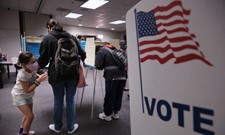By Terri Wu

LAST POSTED: November 9, 2021
LOUDOUN COUNTY, Va.—A grassroots election integrity initiative has led to more than 3,000 new poll watchers—the majority of them conservatives—working during the Virginia gubernatorial election. The result was a much higher Republican poll watcher presence at the ballot box.
Traditionally, more election officers and poll watchers have been Democrats.
“For over a decade, [Democrats] have focused on the election system, the election office, and changing the way people vote,” Cleta Mitchell, a senior legal fellow at the Conservative Partnership Institute, told The Epoch Times.
However, during this Virginia gubernatorial election, Republican poll watchers outnumbered Democratic ones, according to Jonathan Haines, vice president of the Virginia Institute for Public Policy.
Poll watcher turnout tends to be low in most elections, except for in general elections for the presidency, according to Haines. But it was different in Virginia this time. In Loudoun County, Republican poll watchers were present almost every day at all four polling locations throughout the 45-day early voting period, according to Shelley Oberlander, chairperson of the Election Integrity Workgroup of the Loudoun County Republicans.
Citizens “really rose to the occasion,” according to Oberlander.
“I think once they start getting educated and really learning the process and what was involved and that they could make a difference in integrity, they did,” she told The Epoch Times.
10 Months in the Making
In February, a group of grassroots nonprofit organizations began an election integrity drive with the aim of using the Virginia gubernatorial election as a beta to “restore trust” in elections. They formed the Virginia Fair Elections Coalition, composed of more than 20 mostly conservative groups. Both the Conservative Partnership Institute and Virginia Institute for Public Policy are partner organizations.
According to Mitchell, the entire cycle—from forming a coalition to dispatching new watchers to polls—took almost a year.
The election integrity issue hasn’t been in the public spotlight as much as parents’ rights and education, but it’s a significant concern for many voters, according to coalition leaders. They’re confident that what has worked in Virginia can be replicated in other states.
Such actions are already underway. On Nov. 10, an 18-city tour will kick off in Georgia to start building a similar coalition there, according to Jenny Beth Martin, co-founder of the Tea Party Patriots, a nonprofit based in Georgia and a coalition partner. She said similar election integrity initiatives weren’t implemented in New Jersey, another state that had a gubernatorial election in November, as the coalition focused on Virginia as the pilot state.
In Virginia, the coalition organizations reached out to conservative voters and offered poll-watching certification training for recruits. Those trained would then contact their political parties—or election office if they were nonaffiliated—to become poll watchers for either the Democratic Party or Republican Party or serve as a nonaffiliated poll watcher.
Mitchell said the coalition trained additional members to be part of the “Citizens Task Force,” a grassroots-led group that attended local election board meetings, observed voting machine selections, and observed other election-related procedures to monitor and ensure compliance. These procedures are open to all members of the public and don’t require that observers have certification.
By April, the coalition was hosting a weekly teleconference for group leaders to discuss and exchange progress reports. This turned into a twice-weekly call in July and later became open to all volunteers when the early voting period began on Sept. 17. During this time, the calls became a helpful venue for poll watchers to talk through various real-life scenarios and further their training, according to Haines.
Haines said the coalition trained thousands of poll watchers in total and 300 during an August summit in Richmond, Virginia, alone. The course could also count toward part of the training to become an election officer, given that the subject matter overlaps. Election officers are paid positions that require certification from the local board of elections, while poll watchers are volunteers that are appointed and authorized by the local political parties or independent candidates.
Participation Drives Improvement
According to Oberlander, many Republican election officers in the county had also served as poll watchers during the early voting period. She said the collaboration between election officers and poll watchers went well in Loudoun County, despite initial tension arising from some officers who didn’t like to be observed.
She was thankful to Judy Brown, general registrar with the county’s election and voter registration office, for listening to the Republican Party’s suggestions based on lessons learned from the 2020 General Election and implementing some of them in the November elections. One such suggestion was to ensure that absentee ballots returned by in-person voters were destroyed, so that no one could reuse them. Another was to hire Republican election officers before tapping into the nonaffiliated list to ensure 50–50 representation from both parties.
Oberlander was hopeful for more improvements, such as verifying tabulation results by hand counts in at least a few precincts.
“We researched our machines and our voting equipment. We are trying to learn as much as we can about it,” she said. “Unfortunately, there’s just a lot of limitation on what we can see and understand about our computers. And we just really can’t know much about the software.”
POST SHARED BY Carl Merkh


